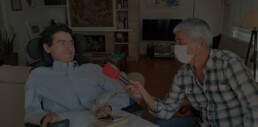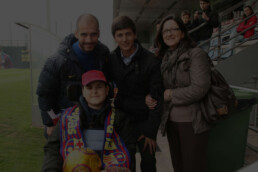"El Convidat" at home
In October, I had a visit that made me very happy. For those who don't know, El Convidat ("The Guest" in English) is an interview program on TV3, the main TV channel in Catalonia, where the host - a Catalan journalist, Albert Om - is invited to spend a weekend at the home of a famous personality in Catalonia.
This time, El Convidat, Albert Om, came to my house, although not to spend the weekend. Obviously not, hahaha. The reason for the visit was to interview me for the program Islàndia, where Albert Om dedicates himself to getting to know stories of all kinds of people.
His interest in interviewing me was because my book had just been published. His personal treatment was very friendly and close, but he acted with great professionalism during the interview. I say this because in a job it is important to separate the personal from the professional.
Once the microphones were on, Albert, with some parts of the book underlined, began to ask questions in his style. I value this way of conducting the interview a lot because it says a lot about a professional.
In addition, the questions were direct and with a great interest in knowing more in-depth about my story and asking why I see things the way I do. He also stopped frequently to let me drink water or rest if needed.
In short, the result of the interview was very good, so much so that for me it is the best interview I have ever had. Once the interview was over, we chatted with him, my parents, and some of my siblings who also liked El Convidat (The Guest) from TV3 and Islàndia from RAC1.
Next, I share the full interview with you. It's in Catalan, but below you can see a small summary.
Updated on 16-11-2020 19:50
Islàndia
"I'm happy, I don't want euthanasia"
Xavi Argemí has Duchenne muscular dystrophy, a terminal degenerative disease.
Xavi Argemí is 25 years old, from Sabadell, studies multimedia at UOC and hasn't left his house since last summer because he has an incurable degenerative disease, Duchenne muscular dystrophy, which makes any cold he catches very complicated. What he wants is to enjoy the time he has left, and to do so he has these pillars: family, friends, spiritual support, medicine, and palliative care.
"Drinking a glass of water, for me, is already a lot." "I don't think about how much time I have left." "Pau Donés gave a very good example and he wasn't a believer."
Xavi has just published a book, with Rosa dels Vents, called Learning to Die to be Able to Live, which is exactly what he has had to do: learn to die to be able to live.
He, who has death so close, wants to explain how he sees life. He doesn't want euthanasia, he wants to live until the last second he can. He believes that people who are about to die need company and not help to end their lives. It is a different perspective, which is worth listening to and respecting, even if it is different from that of many people.
"I'm happy, I don't want euthanasia." "Euthanasia makes us sick people feel like a burden to society." "I imagine heaven as the ultimate happiness."
Albert Om went to meet him in Matadepera. Listen to the conversation they had on Islàndia.
Strength and courage
In the book I explain an anecdote I keep about Pep Guardiola when I was recovering from the back surgery in 2010. One day he called me and to cheer me up he said some words that make me think of the best era in Barça history: "Strength and courage." One day he called me to cheer me up and said some words that make me think of the best era in Barça history: "Strength and courage."
In the summer of 2008 it was a time of change at Can Barça after a blank season that culminated the end of the Rijkaard era and then Joan Laporta, Barça's president, bet on Pep Guardiola who had just trained Barça B in the third division. They did not spare criticism for the lack of experience as a coach to train a top-level team like Barça. The project led by Guardiola would take down heavyweights like Ronaldinho or Deco, would bet on young people from the academy like Busquets or Piqué (recovered from United) and naturally signings that would bring fresh air to the team like Dani Alves. Who would have thought that with this team Barça would make history and become the best team in the world winning all possible titles.
And Guardiola's style not only made them win but also offered a beautiful game to watch for the spectator with the famous "Tikitaka". I'm sure many people enjoyed it even if they weren't culé. All this success is not explained without the way of working, based on effort, teamwork, and constant struggle. To summarize all this spirit, there is an Estrella Damm ad from 2009, which I share with you below, which explains very well what made Barça the center of the world.
This Barça was an example of values beyond the world of football, for me it is a whole inspiration in my constant struggle to overcome the problems and circumstances that a disease like Duchenne entails. So strength and courage to all those who are going through difficult moments or circumstances. You can see where to buy my book on this same blog.
Next, I share a video with images from this unforgettable era and the Estrella Damm ad that I mentioned.
https://youtu.be/FToc8DVY1rU
https://youtu.be/oaczosE4NkU



